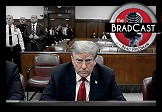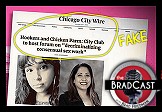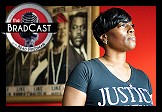READER COMMENTS ON
"On the Last Throes and/or Last-Minute Compromise of the Holt Election Reform Bill"
(8 Responses so far...)
COMMENT #1 [Permalink]
...
Bob Bancroft
said on 7/20/2007 @ 2:29 pm PT...
Brad -
I shared your reaction to the NY Times piece.. it was really odd to read it. I felt that it originated from some sort of quasi-reality, where there is no such thing as a touchscreen ballot marking device, where concern over the integrity of elections doesn't exist, where the principle motivation for the Holt bill is access for the handicapped, where lobbyists for the disabled have been vocal on the Holt bill, and where Holt's office only interacts with the NY Times.
I found it so strange the way the NY Times suddenly emerged on the subject of the Holt bill, clearly the chosen emissary of this message.
The question I have.. what is the purpose of having committee hearings and markup sessions and debates on the floor when a bill can apparently be re-tooled on the fly without any due process at all? I shudder to think what the "compromise" version will look like..
COMMENT #2 [Permalink]
...
Larry Bergan
said on 7/20/2007 @ 3:58 pm PT...
So we're back to the old standby argument that the voting machines are going to help the poor handicapped people. After all these years, they haven't been able to come up with anything more creative. I thought they had changed the tactic to saying they were worried the poor non-english speaking hordes would not be able to participate.
COMMENT #3 [Permalink]
...
the_zapkitty
said on 7/20/2007 @ 6:30 pm PT...
... Brad blogged...
"... the disabled community wouldn't have had the opportunity to hijack his bill and/or scare the death out of Democrats who are beholden to that voting block"
????
https://bradblog.com/?p=4270
I guess the work by Noel Runyan et al was conveniently swept under the carpet by Holt when attention drifted...
Folks who are blind and strenuously object to Holt's deceptive practices, like myself, apparently have no business getting in the way of the big-money PAC's when they want to pimp us...
COMMENT #4 [Permalink]
...
Dredd
said on 7/20/2007 @ 7:46 pm PT...
The nirvana of many movements is
COMMENT #5 [Permalink]
...
Karen Renick
said on 7/21/2007 @ 2:23 am PT...
Brad blogged:
"I’ll make it easy: A paper ballot — that is actually counted — for every vote cast in America."
"Actually counted" – using what method or system? I'm quite curious to know why you chose to leave this one piece of critical information out of your Voting 101 lesson.
I would venture to say that many people reading your words of wisdom might conclude that "a paper ballot–that is actually counted” means a paper ballot counted by citizen poll workers in full public view. But, of course, there are many other folks who might think, instead, of a paper ballot counted by an optical scanner because that’s the way they’ve voted for years and think this is just fine - no questions asked.
It would be helpful, at least to me, if not others, to know which method you were thinking of when you wrote this. I am also wondering if you might have used the word “actually” in order to infer the word “accurately"? By using “actually", the door is cleverly kept open so that either counting method works in the reader’s mind.
I contend that your vagueness about the specific method of counting the paper ballot does not make your advice easy to “get", as you portend. Instead, by not spelling out how the ballot is “actually counted", the reader is given the false impression that it doesn’t matter which way the paper ballot is counted, just as long as it is “actually counted", which both methods do.
The truth is, it does matter which way the paper ballots are counted.
When counted by an optical scanner, the paper ballot may or may not be “read” accurately by the proprietary, i.e., secret, software programs running invisibly inside the scanner. Ah, but this is when the White Knight of Audits rides in to save the day. Great PR, but problem is, he can only check out a handful of precincts for skullduggery and there are always a scoundrel or two that may have a hand in the "random" selection of the precincts that get a visit. Also, Mr. White Knight might not get to check out the precincts until after the already-declared "winner" has been whisked off to Washington and sworn in, making audits and even recounts moot.
The Emmy-nominated HBO documentary, “Hacking Democracy” - that appears in the top banner ad on your website - dramatically shows how easy it is to hack an optical scanner. The look of betrayal on the election official’s face in the film, when he learns that the final vote count tallied by the scanner in the mock election has truly been altered by the pre-rigged memory card, is unforgettable and upsetting to see.
Contrast this profound loss of innocence seen in “Hacking Democracy” with the taste of pure democracy in action that is experienced when citizens gather to count their neighbors’ ballots on Election Night. Full transparency, accuracy and citizen involvement are the name of the game with this counting method. And, Mr. White Knight can relax and save up his strength for the pesky dragons and big battles.
On Democracy For New Hampshire’s website, the following three short videos (posted by Nancy Tobi), showing hand counting in action, can be downloaded and viewed for your democratic pleasure:
http://www.democracyforn...shire.com/node/view/2648
Lyndeborough, NH (43MB) - ballot by ballot tally method of hand counting, 980 ballots cast and counted in under four hours with 100% volunteers (no budget item for the town)
Wilton, NH (28 MB) - ballot by ballot tally method of hand counting, 2,274 ballots cast and counted
NH State Recount (23MB) - ballot pile method of hand counting, 22,024 votes cast and counted
So, when you boil it all down, which “actual” counting method will it be - people or machines?
COMMENT #6 [Permalink]
...
Dredd
said on 7/21/2007 @ 5:41 am PT...
The original DRE's were the mechanical lever type machines:
The most recent configuration in the evolution of voting systems are known as direct recording electronic, or DRE’s. They are an electronic implementation of the old mechanical lever systems. As with the lever machines, there is no ballot
(EAC, emphasis added). Of course that depends on the definition of a "ballot". Everyone is afraid to define what a ballot is it seems.
There were different renditions of lever machines and there are as many "ballots" as there are election circuses. Send in the clowns we need more.
So here, for the first time on TV, the true definition of a paper ballot:
A paper ballot is what is at the center of the circle of blind movement stars who are reaching out and touching it and declaring their touchy feely to be the one and only true ... hey everyone lookie lookie there is an elephant in the room!
The original DRE's were mechanical, not electronic, and they produced no "paper ballots". I have to put that in quotes because not only do movement stars "conflated the idea of DREs" they conflate most everything.
There seems to be a minimum of three definitions for everything related to a vote. Oops, what is the definition of "a vote"?
Is a ballot and a vote like the body compared to the mind ??? 
Stalin did not use DRE's since he did use "paper ballots", and each election was verified. The people counted very, very, carefully to make sure the "right" results were in the tabulations. Those who did not count exactly as they were supposed to had accidents.
Deciders are everywhere these daze:
All that foreign oil controlling American soil,
Look around you, it's just bound to make you embarrassed.
Sheiks walkin' around like kings ...
Deciding America's future ...
And there's a slow, slow train comin' up around the bend.
(Slow Train, emphasis added). Once again the truth depends on which star is in your constellation.
COMMENT #7 [Permalink]
...
Savantster
said on 7/21/2007 @ 8:39 am PT...
Karen, I can't speak for Brad, but most of us here (unless things have changed) tend to only support -human hand counting- of ballots. It's the only way I can see to minimize the shenanigans. I suggest going one step further... and having -every- polling station be on camera, broadcast on local TV (not sure how you get down to the precinct level for broadcasting, but I'm sure we can figure it out.. internet feeds, maybe?) and allowing for people living there to watch the counting. Then you transfer the total, on camera, upstream and watch it get added to the "big board".
It's kind of hard to "swing an election" when every ballot/vote has a camera on it. We also need to get more people to care about their local election so we can have more eyes/cameras on the ground making sure boxes of ballots don't "get lost", etc.
There is no "simple" way to have a secure election.. but that's what the DRE companies are trying to sell us.. a promise of "easy".. sure, they can deliver "easy", but then they also give us an easily corruptable system.
COMMENT #8 [Permalink]
...
Brad Friedman
said on 7/21/2007 @ 11:53 am PT...
Karen Renick asked:
"Actually counted" – using what method or system? I'm quite curious to know why you chose to leave this one piece of critical information out of your Voting 101 lesson.
I've spoken about that many times on BRAD BLOG, so to quickly respond in brief, the context of this piece is national legislation. And on that level, simply getting a paper ballot seems to be difficult enough for the time being. So my efforts have focused on first getting the paper ballot for every vote cast, and then allowing state and local folks to fight over how to count them.
Given that it seems nearly impossible (for the moment) to even get that much, I've put my efforts into fighting for the ballots themselves, with the fight about how to count them to follow thereafter. Once we actually get them!
While I suspect that hand counted paper ballots are likely the most accurate, and clearly the most transparent, of methods, I've not endorsed op-scan over HCPB or vice versa. Though I'm happy to go on record saying that op-scan should never be used unless there is a transparent audit process based on a protocol which offers a 99% scientific certainty that any fraud or error in the original machine-based tabulation would be discovered and/or lead to a full manual hand count of all ballots if there are any descrepancies.
I am also wondering if you might have used the word “actually” in order to infer the word “accurately"? By using “actually", the door is cleverly kept open so that either counting method works in the reader’s mind.
No, I meant "actually". That was something I had to add to my call for "a paper ballot for every vote cast" after the Holt bill decided to try and redefine (disingenously) paper trails as paper ballots. I contend that if it's a ballot, it needs to actually be counted. But apparently, Holt doesn't agree, and thus, I had to spell it out that it's not enough to actually have paper "ballots", one actually has to count them.
If the method for counting them is left open in the readers minds, that is no accident, of course, as the thought of hand-counting paper ballots currently scares the hell out of legislators and officials. So for the time being, I'll be pleased if we can get the paper ballots in the first place, so that we can then have something to actually count!
None of which is a silver bullet, as the fight for Election Integrity, we have all come to learn, is a continuing process, and nothing that can be taken for granted, or corrected in a single step or piece of legislation.
Hope that clarifies.


 'Green News Report' 4/18/24
'Green News Report' 4/18/24
 SCOTUS Suddenly Worried About Overcriminalization ... for J6 Insurrectionists: 'BradCast' 4/17/24
SCOTUS Suddenly Worried About Overcriminalization ... for J6 Insurrectionists: 'BradCast' 4/17/24 'Trump Media' Plummeting, MAGA Buyers Losing Life Savings: 'BradCast' 4/16/24
'Trump Media' Plummeting, MAGA Buyers Losing Life Savings: 'BradCast' 4/16/24 'Green News Report' 4/16/24
'Green News Report' 4/16/24 Trump's First Criminal Trial, for Cheating in 2016, Begins in NY: 'BradCast' 4/15/24
Trump's First Criminal Trial, for Cheating in 2016, Begins in NY: 'BradCast' 4/15/24 Sunday 'Party Like It's 1864' Toons
Sunday 'Party Like It's 1864' Toons Biden Closes 'Gun Show Loophole'; Repubs Turn Desperate: 'BradCast' 4/11/24
Biden Closes 'Gun Show Loophole'; Repubs Turn Desperate: 'BradCast' 4/11/24  'Green News Report' 4/11/24
'Green News Report' 4/11/24 'Pink Slime': Fake 'Local News' Sites Proliferating in Advance of Election: 'BradCast' 4/10/24
'Pink Slime': Fake 'Local News' Sites Proliferating in Advance of Election: 'BradCast' 4/10/24 Dirty Tricks and the Dirtiest Candidate Of All Time: 'BradCast' 4/9/24
Dirty Tricks and the Dirtiest Candidate Of All Time: 'BradCast' 4/9/24 'Green News Report' 4/9/24
'Green News Report' 4/9/24 'Titanic Law' Reform Just Tip of Iceberg in Quest for Key Bridge Accountability: 'BradCast' 4/8/24
'Titanic Law' Reform Just Tip of Iceberg in Quest for Key Bridge Accountability: 'BradCast' 4/8/24 Sunday 'Dark Days Indeed' Toons
Sunday 'Dark Days Indeed' Toons Trump's Very Bad Day in Court(s), Other Good (& Less Good) News: 'BradCast' 4/4
Trump's Very Bad Day in Court(s), Other Good (& Less Good) News: 'BradCast' 4/4 'Green News Report' 4/4/24
'Green News Report' 4/4/24 WI Supremes May Restore Drop-Box Voting
WI Supremes May Restore Drop-Box Voting WI Voters Approve Election Crippling Ballot Measures: 'BradCast' 4/3/24
WI Voters Approve Election Crippling Ballot Measures: 'BradCast' 4/3/24  Politico's Josh Gerstein Owes a Retraction
Politico's Josh Gerstein Owes a Retraction More GOP Election Fraud; Overdue Justice for Crystal Mason: 'BradCast' 4/2/24
More GOP Election Fraud; Overdue Justice for Crystal Mason: 'BradCast' 4/2/24 Last Week Today with OG Bloggers:
Last Week Today with OG Bloggers: It's Up to You, New York: 'BradCast' 3/21/24
It's Up to You, New York: 'BradCast' 3/21/24 'It All Comes Down to Brett and Amy': 'BradCast' 3/20/24
'It All Comes Down to Brett and Amy': 'BradCast' 3/20/24 American 'Bloodbath': 'BradCast' 3/19/24
American 'Bloodbath': 'BradCast' 3/19/24
 VA GOP VOTER REG FRAUDSTER OFF HOOK
VA GOP VOTER REG FRAUDSTER OFF HOOK Criminal GOP Voter Registration Fraud Probe Expanding in VA
Criminal GOP Voter Registration Fraud Probe Expanding in VA DOJ PROBE SOUGHT AFTER VA ARREST
DOJ PROBE SOUGHT AFTER VA ARREST Arrest in VA: GOP Voter Reg Scandal Widens
Arrest in VA: GOP Voter Reg Scandal Widens ALL TOGETHER: ROVE, SPROUL, KOCHS, RNC
ALL TOGETHER: ROVE, SPROUL, KOCHS, RNC LATimes: RNC's 'Fired' Sproul Working for Repubs in 'as Many as 30 States'
LATimes: RNC's 'Fired' Sproul Working for Repubs in 'as Many as 30 States' 'Fired' Sproul Group 'Cloned', Still Working for Republicans in At Least 10 States
'Fired' Sproul Group 'Cloned', Still Working for Republicans in At Least 10 States FINALLY: FOX ON GOP REG FRAUD SCANDAL
FINALLY: FOX ON GOP REG FRAUD SCANDAL COLORADO FOLLOWS FLORIDA WITH GOP CRIMINAL INVESTIGATION
COLORADO FOLLOWS FLORIDA WITH GOP CRIMINAL INVESTIGATION CRIMINAL PROBE LAUNCHED INTO GOP VOTER REGISTRATION FRAUD SCANDAL IN FL
CRIMINAL PROBE LAUNCHED INTO GOP VOTER REGISTRATION FRAUD SCANDAL IN FL Brad Breaks PA Photo ID & GOP Registration Fraud Scandal News on Hartmann TV
Brad Breaks PA Photo ID & GOP Registration Fraud Scandal News on Hartmann TV  CAUGHT ON TAPE: COORDINATED NATIONWIDE GOP VOTER REG SCAM
CAUGHT ON TAPE: COORDINATED NATIONWIDE GOP VOTER REG SCAM CRIMINAL ELECTION FRAUD COMPLAINT FILED AGAINST GOP 'FRAUD' FIRM
CRIMINAL ELECTION FRAUD COMPLAINT FILED AGAINST GOP 'FRAUD' FIRM RICK SCOTT GETS ROLLED IN GOP REGISTRATION FRAUD SCANDAL
RICK SCOTT GETS ROLLED IN GOP REGISTRATION FRAUD SCANDAL VIDEO: Brad Breaks GOP Reg Fraud Scandal on Hartmann TV
VIDEO: Brad Breaks GOP Reg Fraud Scandal on Hartmann TV RNC FIRES NATIONAL VOTER REGISTRATION FIRM FOR FRAUD
RNC FIRES NATIONAL VOTER REGISTRATION FIRM FOR FRAUD EXCLUSIVE: Intvw w/ FL Official Who First Discovered GOP Reg Fraud
EXCLUSIVE: Intvw w/ FL Official Who First Discovered GOP Reg Fraud GOP REGISTRATION FRAUD FOUND IN FL
GOP REGISTRATION FRAUD FOUND IN FL


































